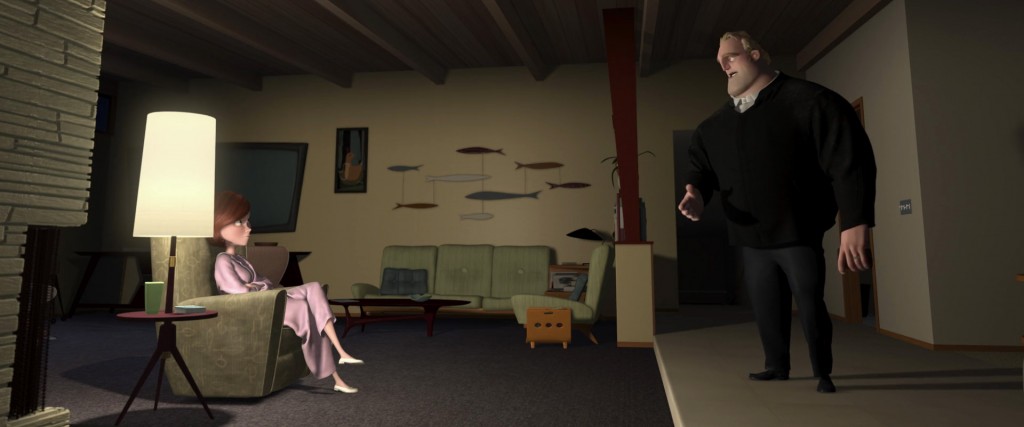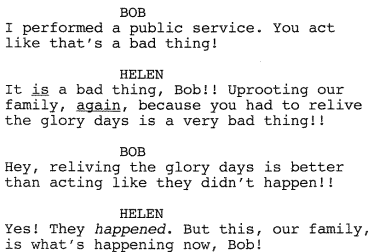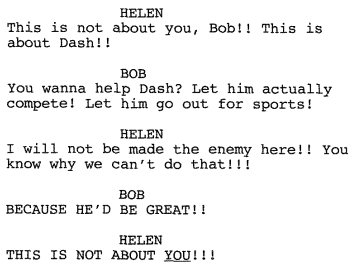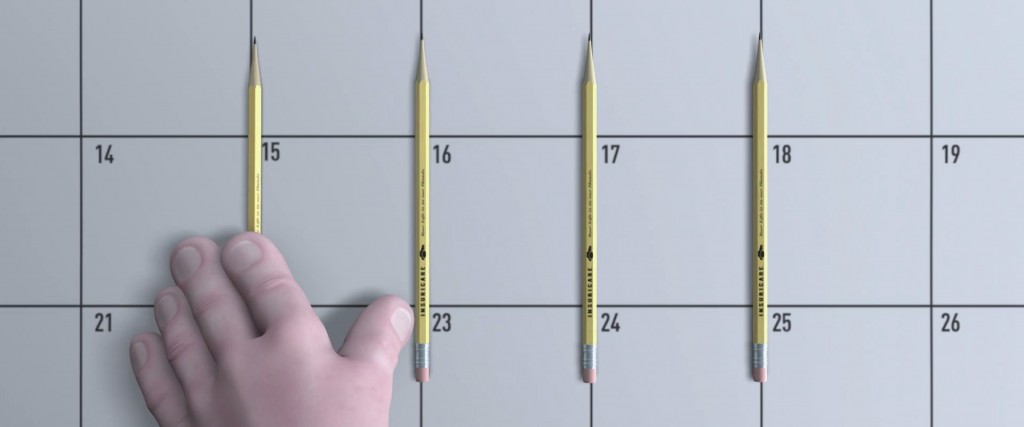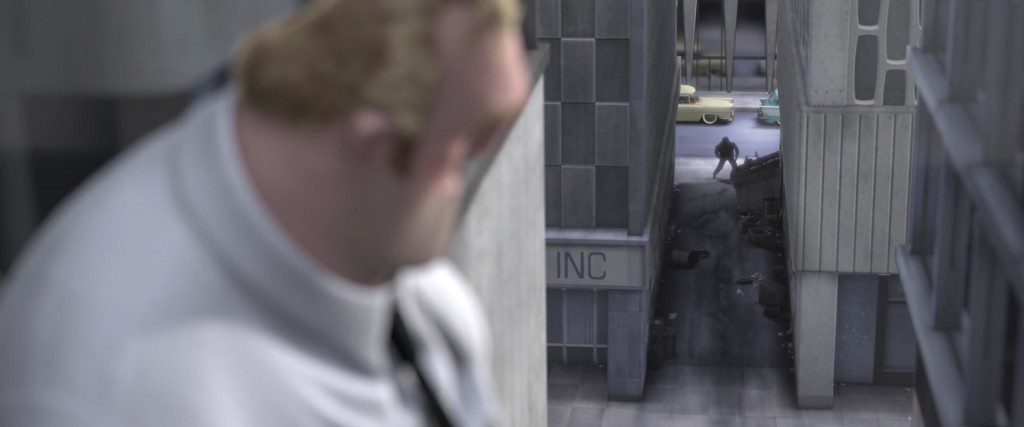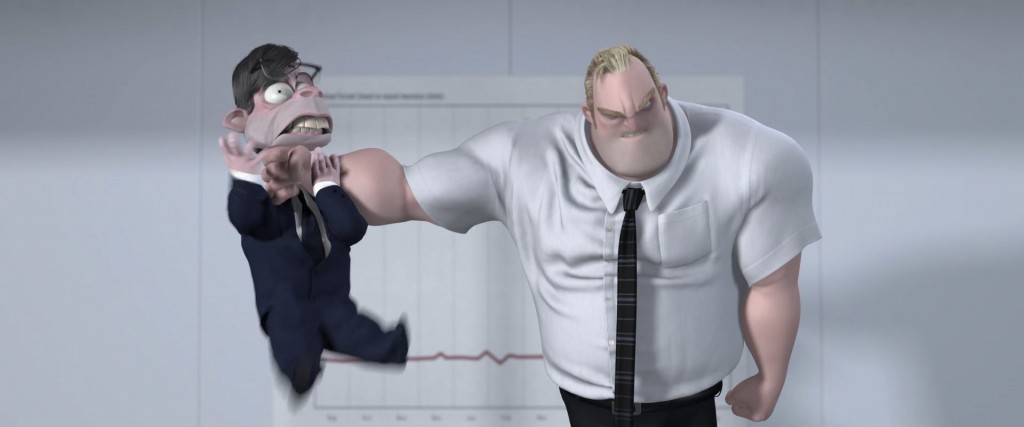There are a hundred ways to measure what makes a great movie, but nothing speaks more highly about a film than how closely you can read it. In his new feature, Deadshirt Editor-In-Chief Dylan Roth explores one of his favorite films by demonstrating just how much there is to talk about, writing at length about Every Five Minutes of runtime.
THE INCREDIBLES
Written and Directed by Brad Bird
(c) 2004 Disney/Pixar
“This is Not About You.” (24:24-27:04)
Bob Parr returns home from his secret weekly ritual to a dark house. Assuming everyone is in bed, he strolls through the kitchen humming his own theme music, grabs a slice of cake off the counter, and takes a massive bite. Suddenly, the lights click on—it’s Helen, practically catching Bob with his hand in the cookie jar. Helen is upset by the lateness of the hour, which Bob brushes off in an insufferably cocky manner. It’s his intention to walk right by her and get into bed before there can be any further investigation into the night’s events, but Bob is, for a superhero in hiding, a lousy liar, and Helen is no fool.
Helen spies a tiny crumb of rubble from the collapsed building on Bob’s shoulder, the way one might find a mysterious hair on their spouse’s sweater. Bob is forced to confess the details of his “little workout” almost immediately. He’s been caught in a lie, betraying his wife’s trust, and is now being dismissive about it. He was out doing something dangerous both for him and for his family, and possibly for the public at large. Bob admits that he knocked down a building (and of course it’s implied that he rescued everyone inside), but unlike in a lot of cartoons or superhero fiction, the wanton destruction of property can’t be ignored, because it’s a key component to the characters’ backstory. Helen isn’t even aware of how close Bob and Lucius were to getting caught, which could have consequences even beyond his own family.
In the film’s docu-style prologue, we see that once upon a time Bob wanted a quiet life, a family, a respite from the neverending battle for truth and justice. He has that now; while his career may be dreary, the rest of his life is downright idyllic. He has his own home; a patient, caring wife; three vibrant, healthy children. Earlier that night, the family dined on leftover steak and meatloaf—the Parr family is not hurting for money. But Bob can’t see any of this.
To Bob, he’s a victim. Robert Parr, Mr. Incredible, born with abilities beyond those of mortal men, has been neutered, forced by a fragile, insecure society to play the role of a bland suburbanite. Having his dream retirement forced upon him has made him bitter against everything that comes with it, including his family. Bob loves Helen, but she’s not who he fell in love with. He fell in love with Elastigirl, a superhero who shared his passion for adventure. The woman in front of him now has left that life behind, happily, and Bob resents her for it. Where she was once his ally, she is now his adversary, a walking reminder both of what he was and what he’s become.
It gets worse, because Bob’s bitterness extends even to his own children. Dash is about to graduate from the fourth grade to the fifth grade, for which there is a ceremony. Bob calls this “psychotic,” offended that his son Dash should be given the same participation trophy as the rest of his classmates when he should be running circles around them, competing in sports, standing out, and standing above them.
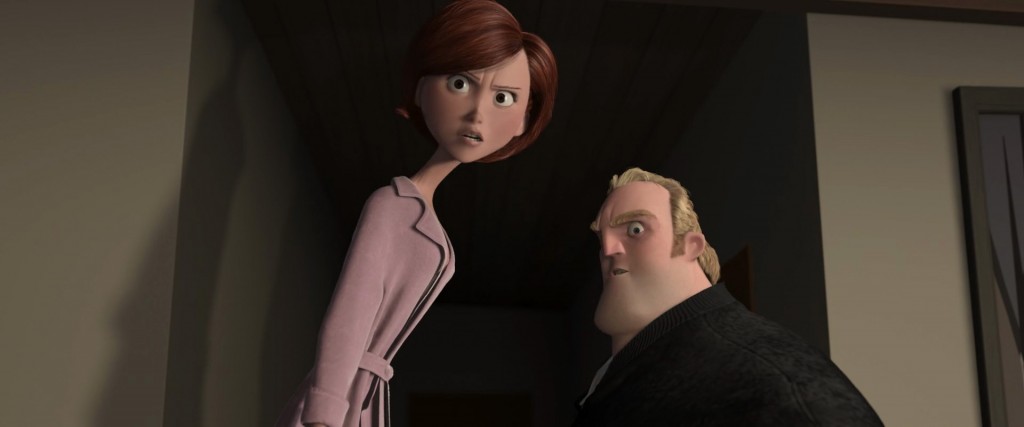
As the conversation gets more heated, Helen stretches above Bob’s imposing figure to claim the literal high ground.
This argument is put on hold when Bob and Helen notice that Violet and Dash have sneaked into the room (invisibly and at super speed, respectively), and knowing how stressful a parental argument can be, they cool off and calm their kids. Again, Bob does love his kids, but he’s dissatisfied with the world in which he and they are forced to live, and that anger towards the world unfairly, unhealthily seeps into his family life. Helen and Bob retire together. There’s no cartoonish banishment to the couch for Bob. As frustrated as Helen is with her husband, deep down, she understands what he’s going through, even if she disagrees with him. This is happening to her, too, and to their kids, and to their old friends. Her problem is that Bob can only see how it relates to himself, and it makes him blind to everyone and everything else. She can see it, even if he doesn’t. So she holds the family together no matter how far apart they grow, because, well, she can reach.
This scene, along with one other in particular about an hour later, has led many critics to contend that writer/director Brad Bird is an Objectivist, and that The Incredibles is an insidious work of Randian philosophy. And while Bird himself flatly denies such an affiliation or intention (and I personally disagree with this interpretation of the film), The Incredibles definitely provides ample evidence for this particular reading. Some circumstances of the film’s story provide some support for it (which we’ll examine as we continue through the film), but most of the harsh Ayn Rand Social Darwinist perspective of The Incredibles comes directly out of Bob’s mouth, during the first half of the film, when he’s clearly framed as being blinded by his own hangups and selfishness.
There’s a great deal to admire in The Incredibles, and high upon the list would be that Bird is brave enough to let the character whose face is biggest on the movie posters for his big Disney family movie make a complete ass out of himself for sixty minutes. It makes the resolution of his character arc—by which time some of his more extreme feelings about his own/his family’s exceptionalism have leveled out—all the more satisfying.
(Here’s an article by Charles Bramesco of The Dissolve that takes a similar position on The Incredibles’ alleged politics.)
The sequence ends quietly, on an aerial view of the Parr residence, just another in a field of identical suburban homes. Their lights—the last ones on in the neighborhood—go out.
Out in a Huph (27:05-29:25)
We’re returned to Bob’s cubicle at Insuracare, but where we last saw him defiantly circumnavigating their system to help those in need, here Bob is dead-eyed, typing out some meaningless paperwork on his computer (which looks out of place in time). The speaker on his desk practically bounces as an equally bored assistant requests Bob’s presence in Mr. Huph’s office, while the boss himself screeches in the background. Bob lurches out of his cubicle, and once he’s out of sight, the impossibly thin Mirage slips in with a manilla envelope. (His deliverance? Or his destruction?)
The scene in Huph’s office begins with a series of close-ups of extremely efficient mundanity: an electric pencil sharpener cutting a utensil down to the perfect size, matching three others, each lined up parallel on a sheet of graph paper on Huph’s desk. When Bob sits down across the desk, one of the pencils rolls out of position, and Huph immediately slides it back into its assigned position. For Huph, everything has its place. Pencils, paper, people.
Huph begins to lecture Bob about the way he prioritizes helping customers over protecting the company’s profits. Bob flatly challenges him to order him not to help their clients (knowing that Huph, legally, can’t say such a thing), and one gets the impression that this set of moves and countermoves has been played before and gotten Bob, narrowly, out of being fired in the past. Bob even anticipates Huph’s prepared speech about how “a company is like an enormous clock.” Like any other chore, getting chewed out by his boss is routine at this point.
But this time, something is different.
When Bob notices a crime occurring just outside their office building, he immediately gets up and starts out of the office, but Mr. Huph orders him to “Stop right there, or YOU’RE FIRED.” Bob stops dead in his tracks, crushing the doorknob in his enormous hand in frustration.
In his former life, Mr. Incredible braved dangers that would crush a normal man in the cause of protecting the public. Now, a garden variety mugging, the kind of crime anyone could conceivably interrupt, is in sight, and all that’s stopping him from leaping into action is one pane of glass and one loathsome little bastard. It’s hard enough for him to sit behind his desk knowing that somewhere, someone could use his help. But to actually have to stand and watch while someone is beaten and robbed right in front of you? Mr. Huph has no idea what a supervillain move he’s just pulled. And maybe it’s that level of wanton cruelty that makes Bob snap:
Bob hurls Huph across the room, smashing a hole through wall after wall after wall after wall.
The villain’s in traction, and the hero’s in big, big trouble.
Check back next week for another installment of Every Five Minutes: The Incredibles. Screencaps are from DisneyScreencaps.com; the screenplay to The Incredibles can be found here.

